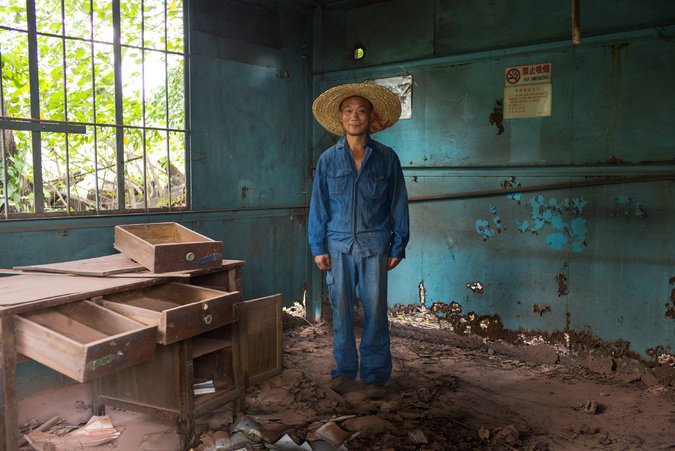
Still, when the party’s congress closes next week, world economic leaders may glean some clues about China’s direction depending on who is named to the Politburo Standing Committee, the seven-person group that makes its top decisions.
Should Mr. Wang be named to the committee, that could suggest a slightly greater emphasis over the next five years on economic reform, such as giving private enterprise more freedom or curbing dependence on state-directed lending.
Advertisement
Continue reading the main story
But the party could send a different signal if it appoints Chen Min’er, the party boss of the less developed province of Guizhou. Mr. Chen’s development strategy there relied on building lots of tall bridges, a giant telescope and other government-led projects, as well as using official influence to help persuade large companies like Apple and Oracle to locate extensive data centers there.
Newsletter Sign Up
Continue reading the main story
Thank you for subscribing.
An error has occurred. Please try again later.
You are already subscribed to this email.
One other possible new member, experts say, is Hu Chunhua, who succeeded Mr. Wang as Guangdong’s party boss. Mr. Hu has a much more cautious reputation on economic changes than does Mr. Wang, though he allowed many of Mr. Wang’s policies to continue. Outside of economics, Mr. Hu has taken a much tougher approach to dissent, crushing an experiment in democracy in a Guangdong village called Wukan that Mr. Wang had tolerated.
The last party congress, five years ago, offered a hint of China’s debt-fueled approach under Mr. Xi.
Joining him then on the standing committee was Zhang Gaoli, who ran the large metropolis of Tianjin. Mr. Zhang was best known for leading a government effort to build a “New Manhattan” — a forest of immense office towers and apartment buildings far from downtown Tianjin, erected in the hope of creating a new financial center. The vast satellite city has begun attracting some residents in recent years but has yet to turn into a financial hub.
By contrast, Mr. Wang was the mayor of an obscure town in south-central China, Tongling, when he wrote a pro-reform essay in 1991 for a local newspaper. The essay — with lines like “History will never allow us to slumber on” — set off a lengthy discussion in Chinese newspapers, giving him a national reputation at the age of 36.
Mr. Wang moved up quickly after that, and by 2007 had become the Communist Party secretary running Guangdong Province. Even before he arrived, the province was one of China’s richest and most entrepreneurial, and more recently it has benefited from a boom in high-end technology manufacturing and the country’s thriving internet scene.
Still, experts say Mr. Wang helped improve Guangdong. Mr. Wang’s administration imposed stringent environmental rules that forced old and dirty industries to give way to new development. Mr. Wang oversaw the construction of the opera hall and other cultural attractions.
Air pollution in the province peaked in his first year there and has been falling steeply ever since, according to satellite imagery analyzed at the Hong Kong University of Science and Technology.
In Guangzhou, the 14 million-resident hub of Guangdong, one of southern China’s biggest steel mills once loomed over the Pearl River. Now a dozen 42-story apartment buildings stand there. A few old furnaces are set to be part of a historical park.
Advertisement
Continue reading the main story
Across the river lies a stream misleadingly named Lychee Bay.
It once reeked with the effluent from nearby homes and from a nearby bronze foundry. A concrete covering failed to contain the smell.
During Mr. Wang’s tenure, the bronze foundry moved away and Guangzhou expanded its sewage processing capacity. The area became so clean that it now attracts tourists.
“Guangzhou is moving faster in dealing with air and water pollution,” said Peng Peng, the vice president of the Guangdong System Reform Research Society, a public policy group. “Guangzhou relies more on consumption, which seems relatively healthy, and pays attention to the quality of economic development.”
After 2012, as Mr. Xi pushed his government-centered economic strategies, Mr. Wang was named a vice premier and largely disappeared inside Beijing’s bureaucracy. There he was given responsibility for mitigating damage from earthquakes and floods and replanting forests.
Should Mr. Wang, now 62, finally join the party’s standing committee and take a more senior position in government, he would have more influence but still would be carrying out an agenda drafted by Mr. Xi.
“Perhaps with Wang Yang,” said Mr. Lam, of the Chinese University of Hong Kong, “they might be able to do a little more within the orders from Xi Jinping.”
Continue reading the main story
Article source: https://www.nytimes.com/2017/10/19/business/china-reform-economy-communist-party.html?partner=rss&emc=rss
Speak Your Mind
You must be logged in to post a comment.